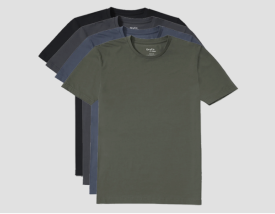For something we’re so familiar with, sweating still has so many mysteries and misconceptions. Researchers have discovered many insights about sweating over the last few centuries. They’re worth knowing especially for people who have hyperhidrosis (or any sweat-related condition) and encounter individuals who may seem apathetic to their plight. This post will take a look at the truths and myths behind sweating, excessive sweating and hyperhidrosis.
5 Surprising Facts About Hyperhidrosis
There are many surprising and frankly, jaw-dropping facts about sweating you’re probably never heard. Here’s a look at some surprising truths about your sweat.
Sweat is a natural antibiotic
Yep, you heard that correctly. Sweat contains a chemical compound known as dermcidin, which appears to regulate bacterial growth of bacteria on the skin. This can help fight or prevent infections and in theory, keep body odour under control. Ironic, isn’t it?
Humans can smell how you feel
Your emotional state can alter the chemical composition of your sweat. An Austrian study made this discovery. The participants wore sweat-collecting pads while they watched scary films one day, and then more family-friendly films the next day. Another group of volunteers were told to smell the pads and correctly identified the pads viewers wore while watching the scary movie. In other words, you can smell the fear.
Humans can smell if you’re well
You may have heard before that being sick changes your body odour. This isn’t a myth or urban legend. Being sick produces metabolic changes that emit volatile organic compounds (VOCs), an occurrence that can happen in the presence of a chronic disease or acute infection. Don’t worry though - your doctor won’t be sniffing you anytime soon.
You have a unique sweatprint
Everyone on Earth (yes, that includes you) has their own sweat profile (or sweatprint), much like your own fingerprint. No two people are exactly the same. What makes your sweat different from others? The blend and consistency of the 373 compounds found in your sweat. Although you carry the same “ingredients'' for sweat like everyone else, the concentration you have of each one differs from the next guy or girl. Coming soon - sweat readers for security purposes.
You enter and leave this world with the same number of sweat glands
You couldn’t grow new sweat glands even if you tried. The amount of sweat glands you were born with is the amount you’ll have for the rest of your life. With that said, you can decrease the number of sweat glands you have by means of surgery, a procedure sometimes recommended for severe or extreme hyperhidrosis.
5 Surprising Myths About Hyperhidrosis
Naturally, there are many misconceptions about sweat that research has brought in the spotlight, yet the masses still believe. Here’s a look at some of these myths.
You need to sweat to have a good workout
Sorry, sweating after a workout is really just an ego boost. The amount of sweating you do after a workout depends on your genetics, room temperature, air flow and the amount of rest you take between sets or intervals. You can determine the quality of your workouts by the type of movements and results you obtain from them, not how drenched you get.
Sweating helps you lose weight
This one is tricky because sweating can lower body weight, but it does it indirectly. Real fat loss occurs hours after your workout session and sweating ends, usually when you’re asleep. Yes, sweat does coincide with a rise in temperature and metabolism, but that doesn’t mean you’ll lose fat. Don’t get fooled by MMA fighters and boxers who dehydrate themselves to make a weight class - they’re simply losing water weight, which they usually regain as quickly as they lose it. It’s all smoke and mirrors, folks.
Sweat causes sweat stains
Nope, it doesn’t. Your deodorant or antiperspirants cause those unsightly stains you love to hate. The compounds in antiperspirants react with proteins in your sweat creating that yellowish blemish. Also, the oils and fragrances in deodorants stain fabrics, giving you the impression that your sweat causes them. Your sweat has no colour (unless you have chromhidrosis), meaning it can’t stain your fabrics in another colour.
You can sweat toxins out of your body
If your sweat was made out of toxic waste, this might be true. But considering the fact that your sweat is 99% water with a little protein, salt, and carbs, there’s no toxins for you to sweat out. So no, sweat doesn’t cleanse you. That’s a job for your liver and kidneys, as well as your intestines. So if you really want to detox your body, drink more water, cut down on sugar and alcohol and eat plenty of fibre. Those are the keys to a toxin-free you, not the sauna.
Excessive sweating is a hygienic issue
This is one of the more insulting myths about hyperhidrosis (and heavy sweating in general). Hyperhidrosis from a dysfunctional sympathetic and parasympathetic nervous system, as well as an increased sensitivity to the neurotransmitter, acetylcholine. The condition is largely genetic and requires specialized treatment. Science aside, hyperhidrosis sufferers often take hygiene more seriously than most, because of the stigma that comes with sweating and the desire to look and feel normal.
Bring the Truth of Sweating to Light
Humans have been curious and studious about sweat and its effects since the beginning of time. We’ve learned plenty, but still have plenty to learn when it comes to sweat. Nevertheless, understanding how facts and myths about sweat can help you develop a more realistic viewpoint of your own health and fitness.
It can even help you eliminate unrealistic expectations and think more positively about yourself. And in this age of information overload and confusion, a little more self-acceptance isn’t a bad thing.
Want to learn more about hyperhidrosis and ways to manage it? Check out our Neat Freaks blog for helpful tips and insights to control excessive sweating.








